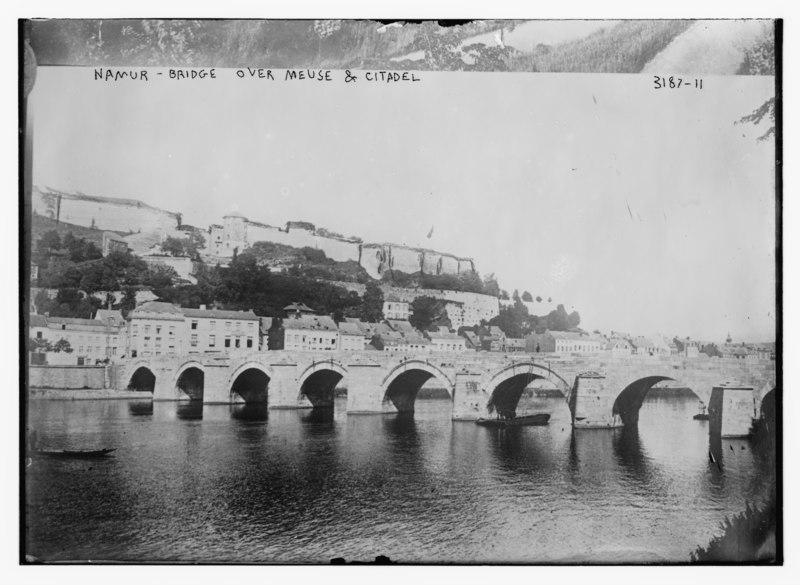With its multiple regions, communities, and languages, perhaps only one topic can fully unite all of Belgium: The origin of fries. Despite the ongoing narrative that fries are Belgian and not French, the golden argument is far from settled.
The famous tale of the origins of the Belgian fries allegedly starts with a frozen river around Namur in Wallonia. Deep-fried fish was a popular staple for many in the area, particularly with the poorer inhabitants. But when a harsh winter left the local Meuse frozen and fish out of reach, something new was needed. Fried potatoes proved a cheap alternative. Or so the story goes.
This frozen river theory comes from a manuscript written in 1781 by Joseph Gérard, later found by his descendant, Jo Gérard, a Belgian historian and journalist. The manuscript traces the fried potato treats back to 1681, according to Unafri, the association for the traditional Belgian fry shop preservation.

Image of bridge over the Meuse in Namur, likely from 1910. Credit: WikiCommons
The reason why the Belgian fries are called French involves a third nationality: Americans. "During the First World War, when they came to help us during the liberation, they saw Belgian soldiers cooking fries. And the officers spoke in French," explained the head of the fry shop at the Fries Museum, in Bruges, Nico Geers.
But although many Belgians will happily cite these stories to claim the golden delights as theirs, not all historians agree to call Namur the birthplace of the fries.
'Not born in Belgium'
In an article from the University of Liège's archives, historian Pierre Leclercq cites fellow academic Farnand Pirotte and points out that potatoes were likely only introduced to Namur around 1735. Additionally, the fat required to fry the potatoes was a luxury product at the time, unlikely to be available for the lower-class locals, as the manuscript suggests.
"The fried potato as we know it today was not born in Belgium," said Leclercq, in an interview with RTBF in 2019. According to his research, their roots are most likely French.
In the same interview, the historian further elaborates that fries can be traced back to Paris in the 1780s when fried sliced potatoes were sold. The stick-shaped fries we know today, however, are thought to have become popular only in the 1840s, also still in France, says Leclercq.

Belgian supporters dressed as Belgian fries at a football game during the World Cup in 2018. Credit: Belga/Dirk Waem
The historian further indicated that the (French) fries migrated to Brussels around 1844, likely through a fairground worker, Frédéric Krieger (later nicknamed 'Mr. Fritz'), who sold fries, reportedly advertised as ‘Paris-style fried potatoes’.
The snack became so popular that it rapidly seeped into Belgian culture. As the popularity of fries in France declined throughout the 20th century, in Belgium it was only heating up.
A (foreign) national treasure
Historic debates aside, fries, and 'frietkot' – snack corners for fries – are an undeniable part of the Belgian zeitgeist.
"If you're going on holiday [outside of Belgium], and you look for a fry shop, you don't easily find them," says Geers. Every year, Geers sees around 100,000 people, who stop by the Fry Museum, to learn more about the fried snack.
In 1984, Unafri was established to protect the interest of chip shops and their gastronomic and cultural legacy. Since then, the ‘frietkot’ tradition has been labelled as "cultural and intangible heritage" throughout the different regions of the country.
The origin of the French/Belgian fries might be contested until the end of time. But regardless of what it says on the birth certificate, the golden treat has done more than enough to deserve a Belgian passport.

